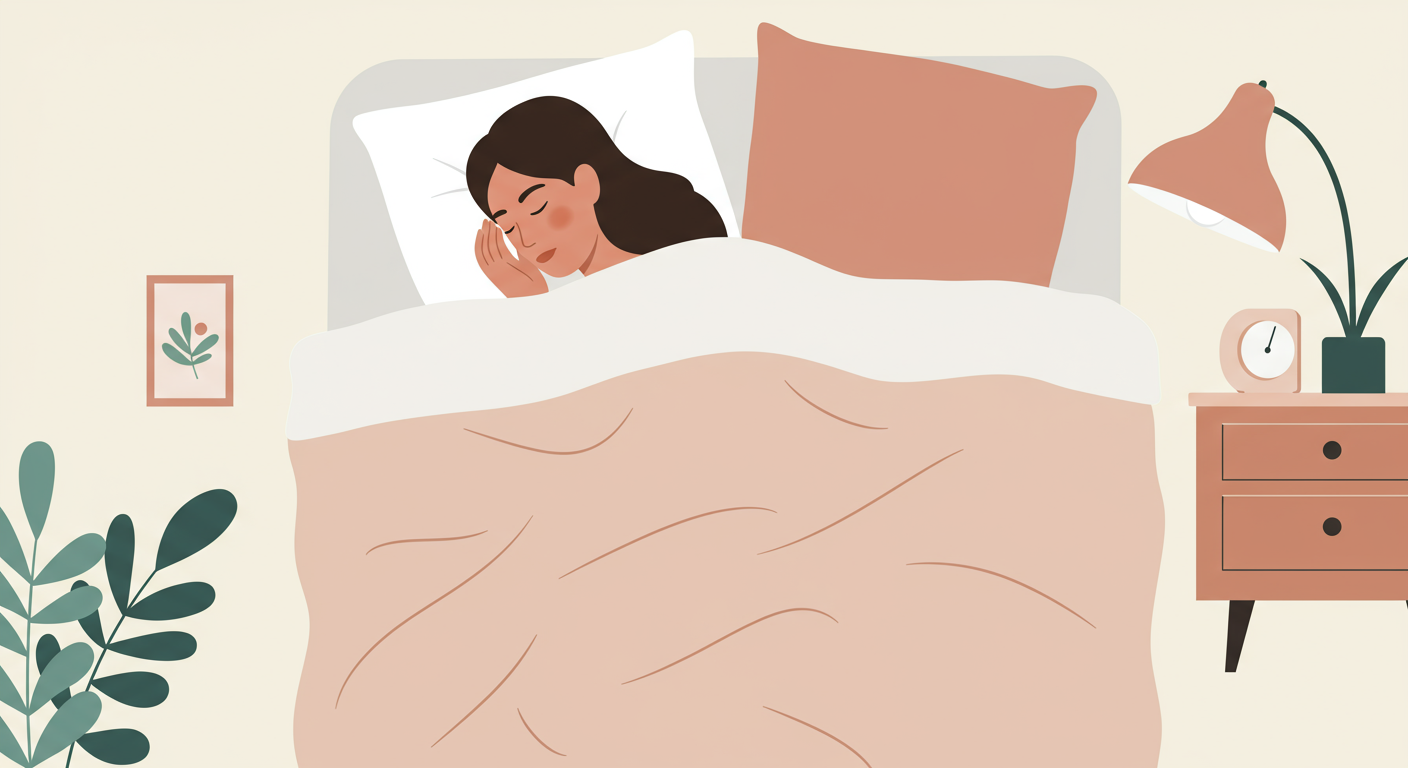Sleep Better Tonight: Ashwagandha's Role in Restful Zzz's
Sleep Better Tonight: Ashwagandha's Role in Restful Zzz's

Are you constantly tossing and turning, longing for a night of uninterrupted sleep? Many people struggle with sleep, making the quest for restful nights a significant health priority. This article dives into how Ashwagandha, an ancient adaptogenic herb, can be a game-changer for improving sleep quality and duration. We'll explore the science behind its calming effects, detail its potential mechanisms for promoting relaxation and reducing stress, and provide practical insights on how it can help you achieve more restorative sleep and combat the challenges of insomnia. Discover how this natural remedy might be the key to unlocking your best sleep yet, offering a gentle, evidence-based path to truly restful Zzz's.
Ashwagandha, scientifically known as Withania somnifera, is a powerful adaptogenic herb revered in Ayurvedic medicine, India's traditional system of healing. For thousands of years, it has been used for its wide range of health benefits, often celebrated for its ability to help the body manage stress. The name "Ashwagandha" itself is quite telling; in Sanskrit, "Ashwa" means horse and "gandha" means smell, referring to the herb's unique aroma and the belief that it can bestow the strength and vitality of a horse.
What Exactly is an Adaptogen?
Adaptogens are a unique class of herbs that help the body adapt to various stressors, whether physical, chemical, or biological. They work by normalizing physiological functions and helping the body maintain balance, or homeostasis. Ashwagandha is perhaps one of the most well-known and extensively studied adaptogens. It doesn't stimulate or sedate; instead, it provides a normalizing effect, enhancing the body's resilience to stress.
A Pillar of Ayurvedic Medicine
Traditionally, Ashwagandha has been used for a variety of purposes, including enhancing vitality, boosting immunity, and promoting overall well-being. Its traditional applications also include support for reproductive health, cognitive function, and, notably, improving sleep. Modern scientific research is now beginning to validate many of these ancient uses, particularly its profound impact on stress reduction and sleep quality.

Sleep is not a luxury; it's a fundamental pillar of health. Yet, for many, a good night's sleep feels increasingly out of reach. Insomnia, characterized by difficulty falling asleep, staying asleep, or experiencing non-restorative sleep, affects millions worldwide. Chronic sleep deprivation can have far-reaching consequences, impacting not just our physical and mental health but also our daily performance and quality of life.
The Cascade of Sleep Deprivation
When we don't get enough quality sleep, our bodies and minds struggle. Physically, poor sleep can compromise the immune system, increase the risk of chronic diseases like heart disease and diabetes, and impact metabolism. Mentally, it can lead to impaired cognitive function, mood swings, irritability, and exacerbate conditions like anxiety and depression. The vicious cycle often starts when stress makes it hard to sleep, and lack of sleep then increases stress.
Modern Life vs. Restful Sleep
Our modern lifestyles often contribute to this sleep crisis. Constant digital stimulation, irregular schedules, high-stress jobs, and a lack of exposure to natural light can all disrupt our body's natural circadian rhythm, making it harder to signal to our brains when it's time to rest. This makes the search for effective and natural sleep aids more pressing than ever.
Prioritizing sleep is crucial for overall well-being. Chronic sleep issues warrant attention and potential lifestyle adjustments.
While Ashwagandha can be a powerful tool, it's important to address foundational sleep hygiene practices. This includes maintaining a consistent sleep schedule, creating a dark and quiet sleep environment, and limiting screen time before bed. Ashwagandha works best as part of a holistic approach to wellness.
Ashwagandha's effectiveness in promoting sleep is largely attributed to its adaptogenic properties and its impact on the body's stress response system. It works through multiple pathways, targeting the very mechanisms that often interfere with a peaceful night's rest. The primary active compounds in Ashwagandha, known as withanolides, are believed to play a significant role in these effects.
Reducing Stress and Anxiety: The Cortisol Connection
One of Ashwagandha's most well-documented benefits is its ability to reduce stress and anxiety. Chronic stress is a major culprit behind insomnia. Ashwagandha helps regulate the body's stress hormones, particularly cortisol. By modulating the hypothalamic-pituitary-adrenal (HPA) axis, which is the central stress response system, Ashwagandha can help bring the body back to a state of calm. This reduction in physiological and psychological stress directly translates to an easier time falling asleep and a more restful night.
Supporting Neurotransmitters: Enhancing GABA Activity
Ashwagandha may also influence neurotransmitter activity in the brain, especially Gamma-aminobutyric acid (GABA). GABA is a primary inhibitory neurotransmitter that helps calm nerve activity in the brain. Think of it as the brain's natural tranquilizer. Studies suggest that certain compounds in Ashwagandha, like triethylene glycol (TEG), might promote sleep by binding to GABA receptors, mimicking GABA's calming effects. This helps to reduce brain excitability, making it easier to drift into sleep.
Improving Sleep Quality Metrics
Clinical studies have shown that Ashwagandha can improve various sleep parameters. These include reducing sleep latency (the time it takes to fall asleep), increasing total sleep time, and enhancing sleep efficiency (the percentage of time spent asleep while in bed). Participants in these studies often report feeling more refreshed upon waking, indicating an improvement in the overall quality of their sleep. This isn't just about getting more hours; it's about getting more restorative sleep.

A growing body of scientific research supports Ashwagandha's traditional use as a sleep aid. Numerous studies, including randomized, placebo-controlled trials, have investigated its efficacy in both healthy individuals and those experiencing insomnia. These studies consistently point to its ability to improve various aspects of sleep.
Key Clinical Studies and Findings
Several clinical trials have demonstrated Ashwagandha's positive impact on sleep. For instance, a 2019 study published in the journal 'Cureus' found that participants taking Ashwagandha extract reported significant improvements in sleep quality, sleep latency, and sleep efficiency compared to a placebo group. Another systematic review and meta-analysis of five randomized controlled trials, published in the 'Journal of Ethnopharmacology' in 2021, concluded that Ashwagandha root extract significantly improved sleep outcomes in adults, particularly those with insomnia. These studies often use standardized extracts, ensuring consistent levels of active compounds.
Mechanisms Supported by Research
The evidence primarily highlights Ashwagandha's role in stress reduction and its direct impact on sleep pathways. Researchers often measure objective parameters like total sleep time and sleep onset latency, alongside subjective measures such as self-reported sleep quality and morning alertness. The consistent findings across different populations and study designs lend credibility to Ashwagandha's potential as a natural remedy for sleep disturbances.
Always choose high-quality Ashwagandha supplements from reputable brands.
When selecting an Ashwagandha supplement, look for extracts that are standardized to contain a certain percentage of withanolides, typically 2.5% to 5%. This ensures you are getting a potent and effective product. KSM-66 and Sensoril are two well-known, clinically studied extracts.
The optimal way to incorporate Ashwagandha for sleep depends on various factors, including the specific product, dosage, and individual response. Consistency is key when using any herbal supplement for therapeutic effects.
Dosage and Timing for Sleep
Typical dosages for Ashwagandha range from 300 mg to 600 mg of a standardized extract per day. For sleep-specific benefits, many studies have shown positive results with doses in this range, often taken once daily. Some people prefer to take their dose closer to bedtime, given its calming effects. However, individual responses can vary, so starting with a lower dose and gradually increasing it if needed, while monitoring your body's reaction, is a sensible approach.
Forms of Ashwagandha and Quality Considerations
Ashwagandha is commonly available in various forms, including capsules, powders, and liquid extracts. Capsules are convenient and offer precise dosing. Powders can be mixed into warm milk (a traditional Ayurvedic practice for sleep), smoothies, or other beverages. When choosing a product, prioritize those that are third-party tested for purity and potency to ensure they are free from contaminants and contain the active ingredients as advertised.
Consistency is Key
For best results, aim to take Ashwagandha consistently every day. While some people may notice benefits within a few days, it often takes several weeks (2-4 weeks) of regular use to experience the full adaptogenic effects on stress and sleep. Combining Ashwagandha with other healthy sleep habits, such as a consistent bedtime routine and a relaxing evening ritual, can further enhance its effectiveness.
While Ashwagandha is generally considered safe for most people when taken at recommended dosages, it's important to be aware of potential side effects and precautions. Like any supplement, individual reactions can vary.
Possible Side Effects
Common side effects, though generally mild, can include gastrointestinal upset, diarrhea, nausea, or vomiting, especially when taken on an empty stomach or in very high doses. Rarely, some individuals might experience drowsiness. If any adverse reactions occur, it's advisable to discontinue use and consult a healthcare professional.
Contraindications and Drug Interactions
Ashwagandha may interact with certain medications, including immunosuppressants, sedatives, thyroid hormones, and drugs for diabetes or high blood pressure. It is also not recommended for pregnant or breastfeeding women, or individuals with autoimmune diseases (like rheumatoid arthritis, lupus, or Hashimoto's thyroiditis), as it may stimulate the immune system. People with thyroid conditions should use it cautiously and under medical supervision due to its potential impact on thyroid hormone levels. Always consult your doctor before starting any new supplement, especially if you have existing health conditions or are taking other medications.
While some individuals may notice subtle calming effects within a few days, consistent improvement in sleep quality and a reduction in sleep latency typically take 2 to 4 weeks of regular use. Adaptogens like Ashwagandha work by helping your body adapt over time.
Ashwagandha is not typically a sedative in the same way as some pharmaceutical sleep aids. Its primary mechanism is reducing stress and anxiety, which then facilitates natural sleep. However, a small percentage of people might experience mild drowsiness, especially when starting the supplement or taking higher doses. If this occurs, consider adjusting your dosage or timing.
Studies on Ashwagandha's safety suggest it is generally well-tolerated for periods up to several months. For very long-term use (e.g., beyond 6 months), it's always best to consult with a healthcare professional to ensure continued suitability, especially if you have underlying health conditions.
Ashwagandha's safety and efficacy in children and adolescents for sleep purposes have not been as extensively studied as in adults. It's crucial to consult a pediatrician or a qualified healthcare provider before giving any supplement, including Ashwagandha, to children or teenagers.
Ashwagandha may enhance the sedative effects of alcohol and other central nervous system depressants, including prescription sleep medications. Combining them could lead to excessive drowsiness or other adverse effects. It's highly advisable to avoid combining Ashwagandha with alcohol or other sedatives without prior consultation with a healthcare professional.
Ashwagandha stands out as a promising natural ally in the quest for better sleep. Its ancient wisdom, now increasingly validated by modern science, offers a gentle yet powerful approach to managing stress and enhancing restorative rest. Here's a recap of its key benefits for sleep:
Summary: Ashwagandha for a Restful Night
- Stress Reduction: Effectively lowers cortisol levels, helping the body and mind relax.
- Anxiety Relief: Calms the nervous system, reducing the mental chatter that often prevents sleep.
- Neurotransmitter Support: May enhance GABA activity, promoting a tranquil state conducive to sleep.
- Improved Sleep Metrics: Demonstrated to reduce sleep latency, increase total sleep time, and boost overall sleep efficiency.
- Natural and Adaptogenic: Works with your body to restore balance, rather than forcing sleep.
- Enhanced Well-being: By improving sleep, it contributes to better mood, cognitive function, and physical health.